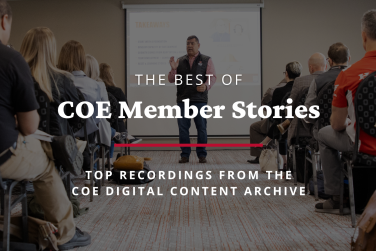
Building an Adaptive Culture
“Adaptive leadership is specifically about change that enables the capacity to thrive” - Ronald Heifetz, Alexander Grashow, and Marty Linksy in The Practice of Adaptive Leadership
The challenges that face us today require a different form of leadership. One that is more adaptable to the changing environment and circumstances. When leaders engage in this form of leadership, they will find that they can achieve their results in less time and sustain the efforts for longer. This concept comes from the research of Ronald Heifetz on adaptive leadership.
Adaptive leadership emphasizes the necessity for organizations to continuously evolve and address dynamic challenges in their environment. Adaptive organizations are therefore organizations that develop their systems, policies, and leaders to embrace this fundamental concept.
There are five essential qualities that characterize adaptive organizations. These qualities allow organizations to confront challenges, foster a resilient culture, and build long-term capacity for change.
These are:
- Naming the elephants in the room.
- Sharing responsibility for the organization’s future.
- Encouraging independent judgment.
- Developing leadership capacity.
- Institutionalizing reflection and continuous learning.
Naming the Elephants in the Room
Adaptive organizations are adept at identifying and addressing unspoken issues, commonly referred to as "elephants in the room." In many settings, these elephants represent difficult conversations or unresolved problems that are avoided to maintain equilibrium. In adaptive environments, open communication is prioritized. Leaders encourage transparent discussions where no issue is too sensitive to broach, even if it challenges authority or disrupts the status quo.
This quality fosters a culture of vigilance. Meetings in adaptive organizations incorporate structured inquiries to surface overlooked issues. Questions like “What are we missing?” are normalized, driving a continuous dialogue that prevents problems from festering unchecked.
Sharing Responsibility for the Organization’s Future
In many organizations, departmental silos or territorial mindsets inhibit collective progress. Adaptive organizations counteract this tendency by cultivating a shared responsibility for the enterprise’s success. Employees at all levels are encouraged to view challenges beyond their immediate roles as shared concerns. This ethos drives cross-functional collaboration, enabling the organization to address complex problems effectively.
When done well, a culture that values shared accountability, unity, and collective ownership emerges.
Encouraging Independent Judgment
Adaptive organizations value the diverse perspectives of their employees. They recognize that relying solely on senior leaders for answers can limit innovation and slow responsiveness. Instead, they cultivate a culture where independent judgment is encouraged and valued. Employees are not bound to replicate the preferences of their superiors but are empowered to think critically and propose solutions aligned with the organization’s mission.
This independence is particularly vital when tackling adaptive challenges, which often lack clear solutions. When fostered, independent judgment and dynamic deliberation enable the development of robust strategies.
Developing Leadership Capacity
An organization’s ability to adapt hinges on its leadership pipeline. Adaptive organizations invest in leadership development as an integral part of daily operations. Beyond traditional training programs, these organizations prioritize on-the-job learning and mentorship. Managers play a crucial role in identifying and nurturing potential successors, ensuring that leadership transitions strengthen the organization’s resilience.
Succession planning is a key indicator of this quality. Organizations with robust adaptive capacities actively mentor individuals who can surpass their predecessors. By embedding leadership development into the organizational culture, these entities build the human capital necessary to navigate future challenges.
Institutionalizing Reflection and Continuous Learning
Adaptation necessitates a commitment to ongoing learning and self-reflection. In adaptive organizations, mistakes and failures are treated as valuable learning opportunities rather than grounds for punishment. They create mechanisms to capture and disseminate lessons from experiences, enabling the organization to evolve continually.
Organizations with a continuous learning mindset engage employees at all levels in strategic discussions, leverage the insights of frontline workers, and facilitate cross-boundary interactions. They also embrace practices like debriefings, retreats, and sabbaticals to foster reflection and innovation. Adaptive organizations view strategic plans as living documents, open to refinement as new information arises.
Closing Thoughts
These five qualities serve as a blueprint for building adaptive organizations. By fostering openness, collective responsibility, independent thought, leadership development, and a learning culture, organizations can enhance their capacity to navigate complex challenges. These principles not only support organizational resilience but also create environments where individuals are empowered to contribute meaningfully to shared goals.
To successfully transform an organization, leaders must learn to assess, reflect, and take focused actions to be intentional about building a culture where employees thrive, leaders inspire, and all work becomes meaningful.
Some portions of this article were enhanced using ChatGPT, an AI language model developed by OpenAI.
Eager to learn more about leadership best practices? The COE Summit 2025 will feature leading researchers and industry experts who know that strong processes start with strong teams. Dr. Bryan Cutliff will lead a breakout session titled, "The Practice of Adaptive Leadership: Building an Adaptive Culture," on Thursday, April 10. This session will feature current research from the field of adaptive and change leadership, examples from the field demonstrating how some organizations embrace the idea of adaptive leadership, and characteristics to assess to determine their organization's readiness for adaptive leadership practices.
The Ohio State University Center for Operational Excellence Summit, now in its 12th year, is a 3-day event dedicated focused on the latest best practices in leadership and problem-solving. With 4 engaging keynotes, 20 breakout sessions, and exclusive opportunities for networking and hands-on learning, the COE Summit is a high-value opportunity to equip your team with the tools and tactics to connect, collaborate, and reach their full potential.
Learn more and register for the COE Summit 2025








